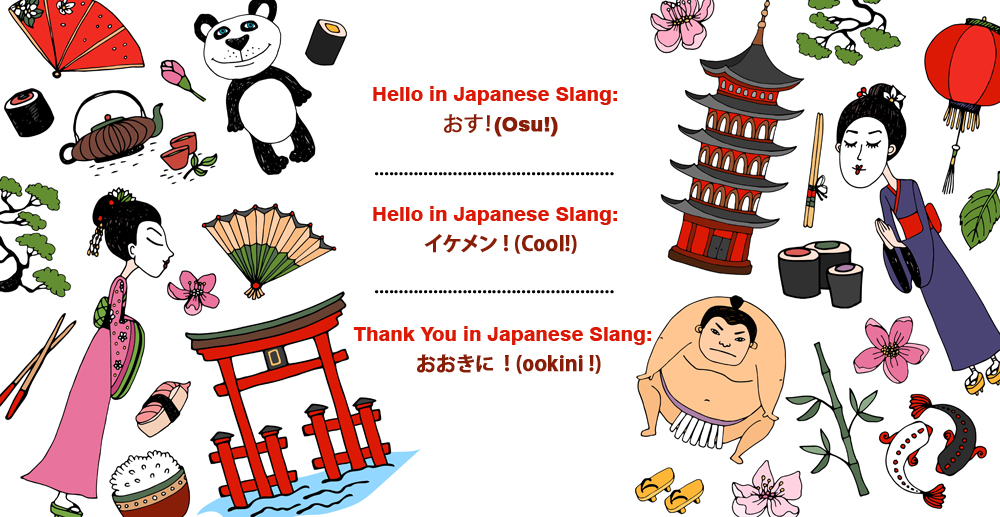The land of the Rising Sun, with its mountainous backdrop, embracing the charming wooden traditional abodes, is beautiful along with its people, who are equally admirable for their politeness and the respect they show and have for one another. So, it’s no surprise that when learning Japanese language, the Japanese words and sentences that the students learn are the formal ones. Now the question is: Do you want to expand your Japanese language skills? Do you know how to use Japanese Slang?
No? Don’t fret because we got you covered in this article where we are going to share only Japanese slang words. Are you still up for it?
Yes? Well then, let’s begin. Here are some Japanese slangs that you ought to know if you are living in Japan or you have Japanese friends.
How To Use Japanese Slang?

- Ossu (おっす)
When you see your friends or pass by them, we usually say “What’s up/’ or “Yo!”. Well, in Japanese that would be Ossu. - Omae (お前・おまえ)
This particular Japanese slang means calling someone “You” in the most impolite way. It may be an insult but, when used between friends, it can become a friendly insult. - Choushi dou? (調子どう・ちょうしどう?)
This is commonly used when friends meet up with each other or pass by one another on the road. When you ask “Choushi dou?”, you are basically saying “How’s it going?” or What’s new?” or “How have you been?”. - Yabai (ヤバイ)
You see someone with unreal talent and you go “That’s insane!” or “That’s wild!”. Well in Japanese that word would be Yabai, which actually translates to dangerous. It’s like when one may say, ‘Her dance moves are so sick that it’s insane”. - Maji manji (まじまんじ)
Usually used between young females, “Maji manji” can mean “For reals?”, which is also a slang for “Really?” or “Are you serious?” - Otsu! (おつ!)
A short way of saying Otsukaresama desu (お疲れ様です), which is a way of saying ‘Good work today”, Otsul! Can be said to people you are close to at school or at work after a long day of working. - Donmai! (ドンマイ!)
If you sound it out Donmai! sounds like “Don’t mind”, which it is often used for. It can also be used when you mean to say “It’s all cool” or “Don’t worry about it” or “No problem!” - Busukawa (ブサカワ)
A word play between busaiku (ugly) and kawaii (cute), busukawa can be used to refer to something that is ugly yet cute in a way. For instance, little pigs are ugly and dirty yet utterly cute, don’t you agree? - Uzai (うざい)
This can be used when someone or something is annoying or bothering you. This can be used in instances like let’s say you are in the middle of your work or doing your homework but the loud music the people downstairs are playing keep on annoying you. - CHOU (超)
CHOU, which is typed in all caps, a word used for emphasis. It is akin to English words such as “VERY’ or “SUPER”. For instance, you see a video of a cute dog on your IG feed and you want to say “SUPER adorable” in Japanese. You can type “CHOU Airashī”.
Some Other Slangs in Japanese Language

How to say Hello in Japanese Slang?
おす!(Osu!)
おす is a manly, shoptalk way of hello to different folks. Young ladies don’t commonly say this. Furthermore, folks wouldn’t say it to young ladies.
How to say Cool in Japanese Slang?
イケメン ! (Cool!)
イケメン It comes from the word ikeru for “cool” and menzu for the English-derived word for men.
How to say Thank You in Japanese Slang?
おおきに ! (ookini !)
This is used to say Thank You in a Japanese Slang way.
We hope the above-mentioned Japanese slang words come in handy when you are with your friends and loved ones.
Remember to use these Japanese words only in front of your friends or people you are very close with. Do not use them at your workplace or to your elders.
If you want to learn Japanese language, AKAL Japanese Academy is the best Japanese school in India for you.
About AKAL Japanese Academy
Situated in Green Park, New Delhi, AKAL Japanese Academy focuses on imparting Japanese language and cultural training to students, TITP trainees, and highly skilled professionals who are interested in Working or Living and Studying in Japan.
Akal Japanese Academy, one of the best institutions in India to learn Japanese, will give you ample opportunities to study or live in Japan. Here, not only will you be taught Japanese, but you will also get the opportunity to familiarize yourself with Japanese culture, arts, entertainment, and heritage. And if you are someone who wants to live in Japan, then learning Japanese language is a must.
Now that you’ve learned some of the most common Japanese slang and got a quick peek at what AKAL Japanese Academy is all about, we will leave you here with our best wishes.
Until next time, sayonara for now!








